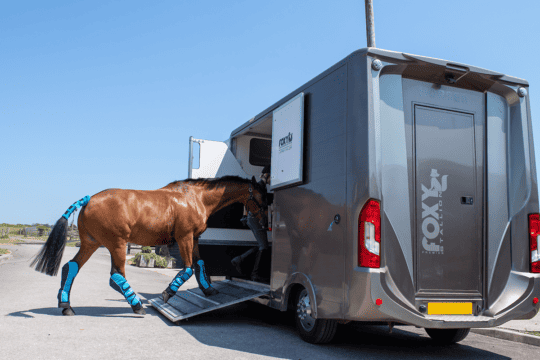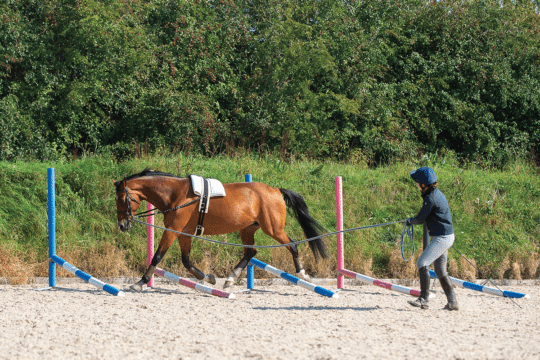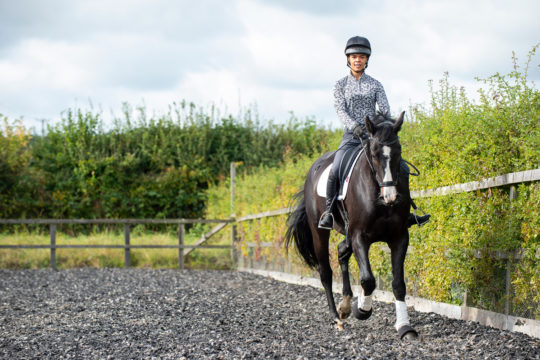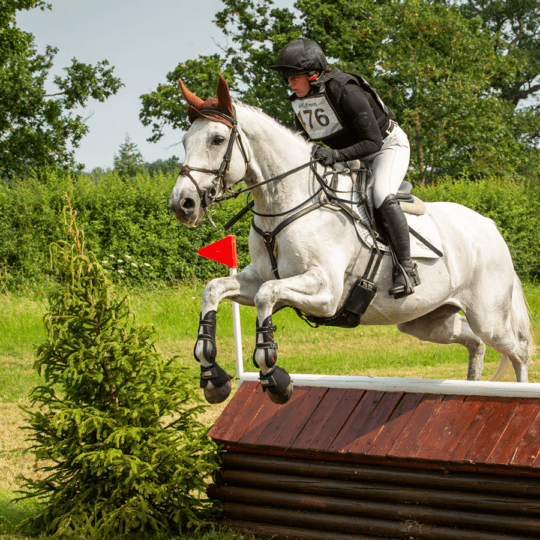Feel confident with any horse
Posted in Riding Schooling and Training Hacking Groundwork and Handling
Most of us have had a confidence crisis when riding or handling an excitable or tricky horse, but when you’re armed with the correct tools, the situation becomes much more manageable
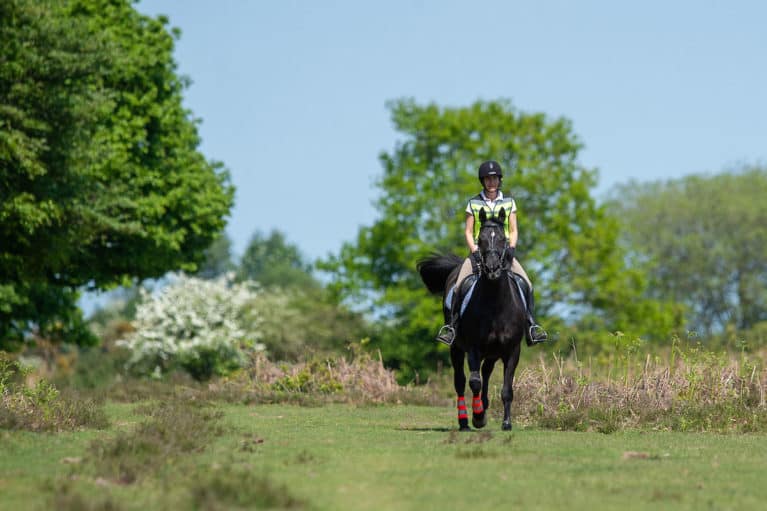
Whether you’re clinging on to the end of the leadrope while your horse launches himself on the way out to the field for his allotted hour’s turnout or sitting perched while he jogs sideways up the road, flinging his head and snorting, it’s not a lot of fun. The temptation is to avoid doing it, maybe only riding a couple of times a week instead of most days, but the less your horse gets out, the more the problem will escalate, so the only thing for it is to crack on while keeping yourself as safe as possible.
Safety first
It goes without saying that you should always wear sturdy boots, gloves and your hat, and a body protector and air jacket can provide extra safety, as well as having the psychological benefit of making you feel safer.
Avoid taking unnecessary risks – for example, if it’s blowing a gale, don’t ride that day or if there are roadworks, go a different way – and think about what usually keeps your horse calmest – maybe it’s hacking with just one companion or going out in the field first. Don’t be afraid to speak up if you need to ask others to make allowances for you, such as letting you turn your horse out first.
Make sure someone knows where you are and that you have a fully charged phone with you, even if you’re just going out to the field.
Getting on board
When you’re riding there are various different scenarios that can light up your fresh horse, sometimes leading to behaviours such as bucking, rearing, spooking and even bolting. If your horse can be a handful to ride after a few days off or on a sharp, frosty morning, these tips will help you stay safe and in control…
1. If you have a ‘safe’, quiet route, stick to that on days when your horse is feeling sprightly
2. Don’t go anywhere potentially exciting – avoid wide, open spaces or anywhere where you’re likely to encounter other riders having a blast
3. Always use a neckstrap – you can hold it all the time if it makes you feel safer
4. If you’re feeling nervous, your horse will pick up on it and be more likely to react in an unfavourable way. Check that you aren’t perched forward or hanging on the reins and that you’re breathing – take deep breaths and even try sighing
5. Singing or talking to your horse will make you breathe, distract you and soothe your horse. Try talking in an assertive, confident voice – it’s really empowering to hear that voice come out when you’re quivering inside and it’ll give you a boost
6. Keep your heels down and your head up. In the event of a problem, this will help you stay on board – your head is the heaviest part of your body, so if you’re looking down, that’s where you’re likely to end up
7. If your horse has a habit of bucking or rearing, keep him moving forwards. These behaviours can happen when fresh horses feel the need to go, but their energy is being contained by the rider
8. Trot is your friend when your horse is feeling fresh, so do lots of it. It gets him moving enough to take the edge off, but isn’t usually exciting enough to cause acrobatics
9. Don’t stop riding and become a passenger. Think about how you’d ride if you were feeling confident and replicate it
10. It’s tempting to ride without your leg on when your horse is being forward or bouncy, but your leg will reassure him as well as give him the direction he needs, so keep using it, even if your legs rest lightly against his sides
11. If you ride out with company, make sure that they’re happy to go at whatever pace you’re comfortable with. If you can call the shots when it comes to where you go and how fast, you’ll feel a lot more confident than if you’re having to step up a gear to keep up when your horse is feeling edgy and you’re not ready
12. If it’s safe to and your horse doesn’t have an injury that prevents it, lunge him before you get on
13. When your horse grows taller and raises his head it can feel intimidating and like something is going to happen, but all he’s doing is trying to get a better look at something suspicious that’s caught his eye in the distance. Reassuring him that there’s nothing scary with your voice and wither scratches can help diffuse the situation
14. Do lots of exercises, and changes of rein and pace to keep his mind on the job and not how fresh he’s feeling – you can even incorporate this out hacking
15. A scratch on the withers lowers your horse’s heart rate. This is something you can do to help relax him when he’s feeling tense and you don’t need to take your hand off the rein
16. If he starts to spook at something, try to ignore the fact that it’s there and ride shoulder-in past it, with your horse’s head facing away from the spooky object
17. Your horse puts his head between his knees to buck, so if you think a buck might be on the cards, keep his head up
18. If your horse tanks off with you, try circling him until he runs out of steam. If his steering isn’t functioning, try bracing one hand against his neck and pulling up with the other hand
19. If he’s strong, bridge your reins (pass one rein over the top of the other against your horse’s neck and hold them both in both hands). Doing this will cause your horse to pull against himself instead of you
Coping on the ground
Horses aren’t only exuberant when ridden. Freshness can cause them to become bargy in the stable, drag you around the yard or leap around on the end of the leadrope, but there’s lots you can do to help rein him in, leaving you feeling more confident…
1. Lead your horse using a lunge rein so if he has a leap around you can keep your distance but still hold on to him
2. Put a bridle on your horse to lead him as it’ll give you more control
3. If he’s a foodie, use it to your advantage. Having treats in your pocket or hand will help distract your horse from the excitement of wherever he’s going, then you can reward him with one for good behaviour when you reach your destination. Be careful not to reward bad behaviour, though
4. Just like when you’re riding, make sure you’re not sending nervous signals to your horse. Check you’re not gripping the leadrope and keeping a solid contact on it, and make sure you’re breathing. Again, gently singing or talking to him can help keep both of you calm
5. It can be worrying when your horse starts whinnying loudly and frantically to his friends, but keeping another horse in sight can help prevent this situation occurring
6. If your horse is feeling particularly sprightly or it’s a windy day, for example, and it’s making you feel more nervous than usual, ask someone else who is confident handling him to turn him out for you. Your nerves will only make the situation worse, plus, it may help you to see how they handle the situation and perhaps you can replicate some of their tactics next time
7. If your horse is bargy in the stable, put up a chain or stall guard inside the door so he can’t push his way out when you open it. Make sure you have hold of him before taking down the chain
8. If your horse tries to charge off, try circling him around you to help slow him up
9. When you release him in the field, be aware that he’s likely to kick up his heels if he’s feeling fresh. Turn him to face the gate before you let him go and don’t turn your back on him until you’re safely out of the gate
10. Ask someone to walk out to the field with you, so they can deal with things such as gates and also provide some moral support
11. If getting your horse out to the field is a problem, try turning him out after you’ve ridden, when he’s not feeling quite so energetic
12. If your horse is quieter to handle when there’s less going on at the yard, consider tweaking his routine so you see to him when fewer people are there, perhaps very early in the morning or later in the evening
13. Spend time practising groundwork in an enclosed area such as a school. This will ensure that he understands your commands and what’s expected of him, and the better trained he is, the more chance you’ll have of controlling him and keeping his attention when the excitement begins to take over
14. Try lungeing or free schooling your horse in the arena before turning him out in the field to get the freshness out of him
15. Fake confidence and calmness when handling your horse. It takes practice, but it’s possible, and if your horse feels like you’re calm and in control, he’ll feel more settled. Even if your insides feel like jelly, walk up to him assertively, handle him like you would if you were confident and talk to him in a bold, carefree voice. You might even find that behaving in this way makes you feel a little more confident inside
Celebrate your success
Think about the positives every day, even if things are still very tricky and your nerves feel shredded – there will be little achievements, no matter how small, and they all count. Maybe you stayed on when your horse had a moment, had a bit more of his attention on the way in from the field or simply feel more in control of the situation. Whatever you achieve, give yourself a well-deserved pat on the back and next time draw on these positives – when the fear kicks in, remember that you’ve done it once so you can do it again. Before long, you’ll look back and realise that you’re doing things you’d never have coped with before.




